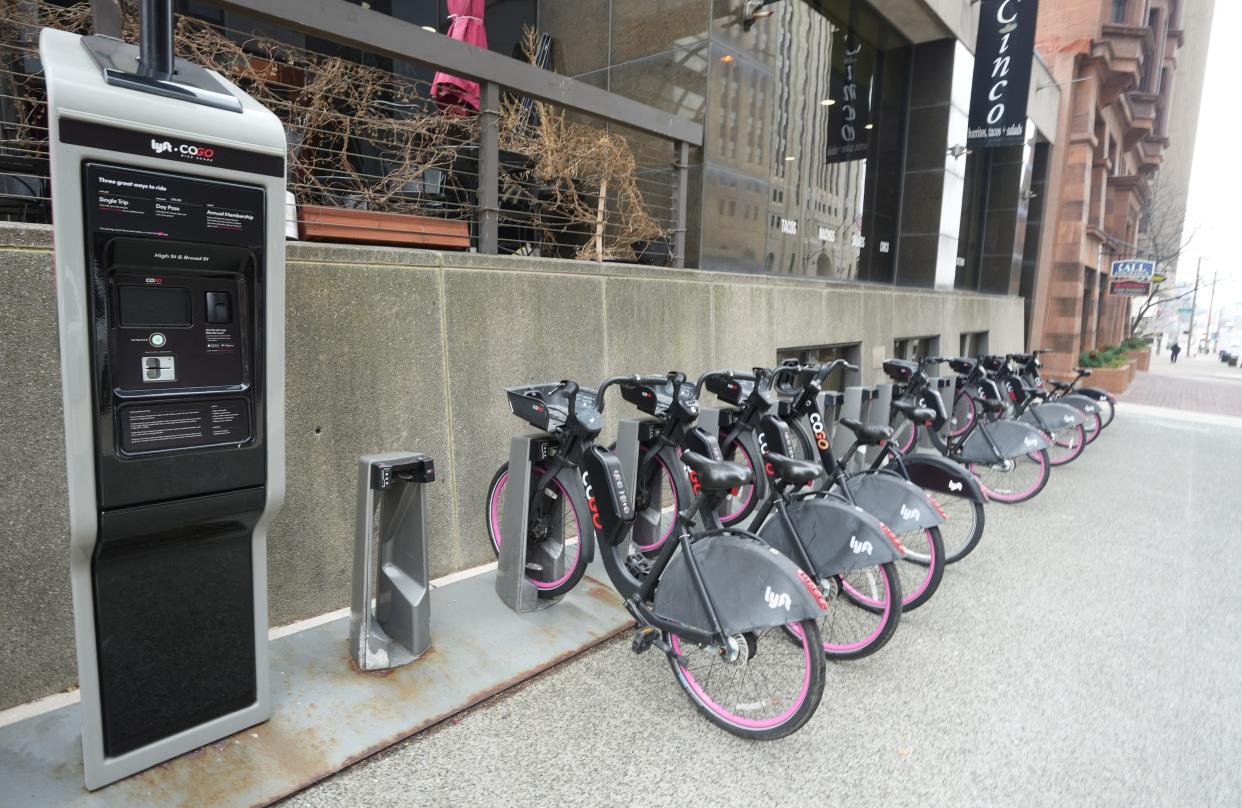Columbus funding for CoGo Bike Share rental program costs city taxpayers another $600,000

Columbus City Council has given another $600,000 subsidy to the CoGo Bike Share network owned by Lyft, which operates 600 rental bicycles at 88 stations around the city, in order to sustain the operation through the first half of 2024.
The funding approved by City Council at its Monday meeting follows a $500,000 subsidy for the second half of 2023 made last July and $510,000 three months before that. The three allocations since last April total $1.61 million and equal the purchase cost of more than 3,200 basic bicycles costing $500 each.
"The funding needed to support the proposed contract modification was calculated based on the current monthly operational costs for the CoGo Bike Share program," according to an explanation attached to the ordinance, which called the service "a low-cost option for alternative transit and personal recreation resulting in more than 50,000 rides annually."
But running at $1.1 million per year translates into a potential city per-ride subsidy of more than $20, in addition to what the renter pays Lyft to use the bike, which varies depending on the subscription plan. Prices start at $2.25 for 30 minutes.
The city Department of Public Service couldn't immediately provide a detailed breakdown Monday of the subsidy because a staffer who compiles that data is out for a few days. But Debbie Briner, Public Service's spokesperson, said that during the first nine months of 2023, more than 52,000 trips were taken on CoGo Bikes, traveling nearly 90,000 miles. The average trip is 1.73 miles.
"Each of these trips helps to reduce greenhouse gas emissions in our community and supports the city’s Climate Action Plan goals— specifically supporting an equitable shift in modes of transportation, such as riding a bike instead of driving a vehicle," Briner told The Dispatch in an email.
City Council passed the latest subsidy unanimously Monday without debate as part of its "consent agenda," where dozens of ordinances pass on a single vote.
In April 2023, the city shifted the responsibility for the operation of the bike-sharing program to Public Service from the city's Recreation and Parks Department while simultaneously kicking in another $510,000 to pay Lyft $65 per "bike dock" per month for multiple months. At the time, city officials said they were seeking a long-term sponsor to take over funding the bike rental system from taxpayers.
Briner said Monday that those sponsorship discussions were ongoing.
Council gets update on the Linden Green Line
In other business Monday, the council received an update on the "Linden Green Line," the multi-million-dollar city project to turn an abandoned 80-foot-wide railroad line into a recreational trail with a park that will link the Linden community with various other parks and trails.
Last July, Council approved purchasing the seven-mile-long track and land area containing about 58 acres. The city initially committed almost $5 million to the project, half of which was from a state grant.
City officials said Monday that they are hoping that the federal government will also contribute grant dollars to the project, planned to stretch from Windsor Park, near 17th Avenue in South Linden, to Cooper Park in Northland.
The city is currently taking bids to clear the land of trees and brush, even as the design is being drafted.
"We're strategically looking at lighting, access points, again, roadway crossings," said Brad Westall, in charge of greenways and trails for the city Recreation and Parks Department. "We cross almost 10 major streets," which include Morse and Agler roads on the generally north-south path that parallels Westerville Road.
"You know what, there's not always sidewalks touching this green line within three or four hundred feet in either direction," so amenities — including strategic lighting at points — "are high up on the list," Westall said. He did not give an estimate of the total cost of all of those potential improvements.
While the plan is not "fully designed out yet," it may include small play spaces, family shelters and "a basketball court or two," Westall said. "Certainly connectivity back and forth at over 40 access points that we know of right now," or one approximately every two blocks.
"Fingers crossed that our friends in the federal government will also see the life-changing value of this project and help us out," said Councilmember Nancy Day-Achauer, who heads the Neighborhoods, Recreation and Parks Committee.
The Federal Highway Administration is currently accepting grant applications for the Rebuilding American Infrastructure with Sustainability and Equity (RAISE) program, which offers assistance to governmental agencies to complete critical freight and passenger transportation infrastructure, "including mobility and community connectivity projects that help remove barriers to opportunity." Applications are due at the end of February, with any awards announced this summer.
City officials note the new trail and park would be located within a 10-minute walk of about 131,000 residents.
wbush@gannett.com
@ReporterBush
This article originally appeared on The Columbus Dispatch: Columbus has kicked in $1.61M to subsidize CoGo Bikes since April 2023
